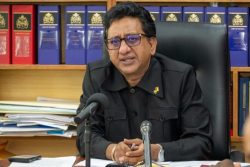The week before last Trinidadian Prime Minister Dr Keith Rowley announced that a Caribbean-wide gangs database was to be introduced along with a Caricom Arrest Warrant. This emerged during a regional symposium held in Georgetown titled ‘Violence as a Public Health Issue,’ when Dr Rowley among other things referred to the transnational nature of gangs.
Illustrative of this, said the report, were accounts in the St Lucia media that gangs from Trinidad were attempting to recruit people from that island, while the Prime Minister of St Vincent and the Grenadines had complained about an increase in gang violence this year. In addition, both St Kitts as well as Grenada had barred Kman Sixx from performing in their territories out of concern for a possible spillover of gang activities.
President Irfaan Ali also spoke, and apart from pointing out the cost of crime and violence in Latin America and the Caribbean, went on to say: “In countries like Trinidad and Tobago and Guyana, we face not only the influx of illegal weapons but also the movement of gangs. This is further complicated by large populations like Venezuela and the international cartels that use our airspace.”
At the time the National Defence Institute was launched two months ago the President had also made reference to the intrusion of gangs and the crimes associated with them in the Caribbean as a whole. He said it had not been strategically determined which gangs were operating both in the region or the country, but they represented a threat. “If we do not, in an analytical way, get to the bottom of this, our small societies will be faced with immense danger,” he warned.
Earlier this year at a Regional Security Service Forum Minister of Home Affairs Robeson Benn had expressed concern about what he called non-state actors on our borders in eastern Venezuela. He explained he was referring to remnants of the FARC and ELN of Colombia, as well as the Tren de Aragua and others of Venezuela, who were involved in drug trafficking, people trafficking and the smuggling of minerals and other things. “We know the risks,” he said.
This year in particular has seen an upsurge in criminal activity in the Cuyuni, mostly perpetrated by the Sindicato gang whose members harass, rob and commit extortion. Residents there reported to this newspaper that they operated from three checkpoints on the river where they stopped Guyanese vessels and demanded payments on the goods they were transporting.
Miners and others were forced to use the river while the airstrip was under repair, but now that work on it has been completed and the Sindicatos will be deprived of their usual source of income, it has to be asked whether they will undertake more raids on miners and other businesses on land. The situation is complicated, of course, by the activities of the Venezuelan National Guard and army on that frontier.
Mr Benn mentioned Tren de Aragua, the most notorious of the Venezuelan gangs. It had its origins in one of that nation’s prisons and has now spread its tentacles across South America and even to the US, where Homeland Security says it is operating in sixteen states. Has it entered Guyana? No one really knows, but one reads of cases of human trafficking by Venezuelans, and occasionally of them being held with guns or drugs. Given the thousands of nationals from the neighbouring state who have taken refuge here it must be presumed that a few of them will be criminals. The unanswered question is how many have links with gangs ‒ Tren de Aragua or others.
The appearance of gang activity here would be no surprise, given the fact that as in other parts of the Caribbean there is a rise in drug-trafficking and the illegal guns associated with it. The GPF reported recently that the highest seizure of illegal firearms in the last ten years was recorded this year, i.e. 162 guns between January 1 and November 11.
Unlike our sister Caricom territories, this country has land borders with some very large, populous states, where gang activity is well established. If we have problems to the west, we also have problems to the south where gang operations are also associated with mining. At the beginning of last month, for example, six masked bandits from Brazil armed with rifles staged a hold-up in south Rupununi, where they stole cash, two Glock pistols and a Movado watch. They also took nine hostages, who were later released after they were pursued by the Joint Services.
Following that robbery and kidnapping the South Rupununi District Council called for a suspension of mining operations in Marudi. The resumption of mining in that area has been contentious for a while, many of the Wapichan people in whose sacred territory it lies complaining that they had not been given the opportunity for free prior and informed consent.
The Wapichan Wiizi Women’s Movement, for example, went on record as saying about the recommencement of mining: “There have been incidents of stabbing, robbery, and assault of villagers … We also believe that the intrusion of large numbers of unauthorized miners has increased the illegal trade of guns and drugs, as well as gold smuggling. We have also observed the presence of prostitution in the area. As Wapichan women we find ourselves facing an atmosphere of fear where our lives and safety are at risk. Our peaceful communities are no longer safe.”
Given the high price of gold on the world market mining has been of particular interest to gangs, and Brazil has urban areas like São José do Rio Prato where illegal gold can be melted down into ingots, after which its origins are virtually untraceable. Some of that gold may well come from this country.
We do now have the National Defence Institute which plans to undertake research into the matter of gangs, while there is too the advent of a Caribbean-wide database. After all, before the gang problem can be tackled, there has to be good quality data on it. While as mentioned, Prime Minister Rowley also referred to a Caricom Arrest Warrant, he described it in the form of a ‘Bill’, which suggests it would require legislative enactment in the various territories. If so, it is not going to come into effect in the immediate future.
Trinidad and Jamaica have serious problems of gang violence, but Guyana should not be complacent. The drug trade aside, which affects every country in Caricom, Guyana has a special challenge in the form of mining. What is happening in what was once a peaceful area in the South Rupununi is a warning, and as an immediate measure mining should be suspended for the time being in Marudi. As for mining areas in other parts of the country, they need to come under far more stringent control at various levels than has been the case in the past. The high price of gold will mean nothing if the gangs get a vice-like grip on the industry. The Mining Arc in Venezuela should be a lesson to our authorities.









